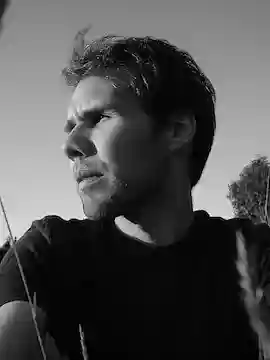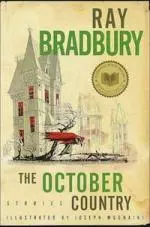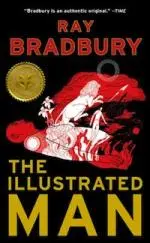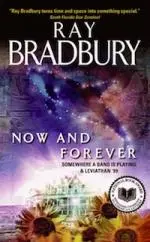Okay, I know what you’re thinking... it’s not like there have been a lack of motion picture adaptations of Ray Bradbury stories. But it’s hard to argue that the handful that have been made (Rod Steiger’s The Illustrated Man) are good adaptations (Francois Truffaut’s Fahrenheit 451), or even all around decent films (the abominable A Sound Of Thunder). I think most Bradbury fans will agree that, at best, these films have, thus far, been interesting footnotes to the original written works. And yet Bradbury is a writer whose work immediately feels cinematic.
The author himself used to tell a story about how when Sam Peckinpah was set to adapt the novel Something Wicked This Way Comes into a film, the way he was going to do it was “rip the pages out of the book, stuff them in the camera and shoot the damn thing!” And it’s true. There are few authors who can conjure such clear and precise imagery with the simplest of language. The majority of Bradbury stories, however sweetly poetic and sentimental, do in fact read like screenplays. Many of them go one step further than that, and really, truly feel like a movie is being projected straight into your mind’s eye.
Whether the following ten stories just offer the seed of an idea for a movie or are already a whole damn flick straight off the page, they all have the potential to be great cinema.
!['The October Country' by Ray Bradbury]() 'The Small Assassin' (collected in The October Country)
'The Small Assassin' (collected in The October Country)
No doubt a classic even casual readers will know, 'The Small Assassin' taps into the horrors of childbirth and child rearing like few other twisted tales out there. The premise is simple: A mother gives birth to a baby she is convinced has a fully developed adult brain, and is trying to murder she and her husband. While Roman Polanski’s Rosemary’s Baby may spring to mind as a flick that features a woman on the edge of a nervous breakdown, 'The Small Assassin' isn’t concerned with the satanic or supernatural, and is instead a cooly fascinating study on the psychology of parenting, or lack of such an ability. Whether as a period piece in early Suburban America or transplanted to post 9/11 hysteria, it’s a story that’s all set to be a tight 90 minute bot-boiler.
Bonus/Alternate take: 'Tomorrow’s Child', about a woman who births a baby whose physical form is split between dimensions, and thus, appears as a blue pyramid with tentacles in our reality.
'Uncle Einar' (collected in The October Country)
What follows is an early passage from the story of uncle Einar:
“Uncel Einar’s beautiful silk-like wings hung like sea-green sails behind him, and shirred and whispered from his shoulders when he sneezed or turned swiftly. He was one of the few in the Family whose talent was visible. All his dark cousins and nephews and brothers hid in small towns across the world, did unseen mental things or things with witch-fingers and white teeth, or blew down the sky like fire-leaves, or loped in forests like moon silvered wolves. They lived comparatively safe from normal humans. Not so a man with great green wings.”
If that isn’t the impetus for a great Pixar-like animated flick, I surely don’t know what is.
And The Rock Cried Out (collected in The Vintage Bradbury)
At a time when racism and prejudice was often veiled in popular American fiction (if they were even discussed at all) Bradbury, living in the already multi-cultural Los Angeles, dared to stare down these topics head-on. A thrilling work with pulpy edges, but no black and white morals, 'And The Rock Cried Out' concerns a white American couple stranded in Latin America after atomic fallout. While mired in Cold War paranoia, the main thrust of the story comes from the white suburbanites’ encounters with the Spanish speaking locals. Rife with racial guilt, further commentaries on class, and with no easy answers present, the story of John and Leonora Webb could easily be transplanted to a modern setting. In fact, it may be more potent now as a movie than when it was first published in Manhunt Magazine in 1953.
![]() 'The Fox And The Forest' (collected in The Illustrated Man)
'The Fox And The Forest' (collected in The Illustrated Man)
At first striking a similar, but ultimately entirely different mood to 'And The Rock Cried', 'The Fox And The Forest' follows a couple on vacation in Mexico in 1938, before revealing itself as a harrowing tale of fugitives -- time traveling fugitives, no less. While its social commenting sights are squarely locked on creating rather obvious metaphors for fascism, the story that arises reads like the very best pulp adventures, sans myopic view. The time travel element (something Bradbury always has fun with in a loose, un-scientific kind of way) also offers us the possibility of a whole other future world beyond the couple on the lam.
'Somewhere A Band Is Playing' (collected in Now And Forever)
Many of Bradbury’s finest stories offer us a surreal look into an American past few of us lived. These summer time towns are rife with a nostalgia that blossoms into a brand new moment of sun dappled porches, of old folks and lemonade, and in the case of Dandelion Wine, of the sound of summer running. A novella published in the last decade of his life, Somewhere a Band Is Playing is perhaps the most joyous and surreal example of what I would call the Ray Bradbury Sentimental Express. The story concerns a young reporter named James Cardiff who finds himself drawn to Summerton, Arizona, a relic in the desert, or perhaps a mirage, where he meets and falls in love with Nefertiti, the Egyptian royal -- albeit inspired by Katherine Hepburn. But like many Bradbury stories, the story here only goes so far before we’re whisked away by a feeling, an impulse, a joy. In cinema some may recall the more fanciful works of Woody Allen (Midnight In Paris), the films of Federico Fellini (upon meeting Bradbury, the great film director exclaimed the author to be his twin) or more recently the whimsy of a Michel Gondry flick.
'Zero Hour' (collected in The Illustrated Man)
Bustling and bubbling over with the rambunctious energy of childhood, 'Zero Hour' introduces us to seven-year old Mink and a neighborhood of kids who are deep into just about the best game ever: Invasion. Here, Bradbury rather gleefully toys with how adults can barely take children seriously, especially when it comes to the workings of the imagination. As the story rather grimly concludes, Mink is left to question her own abilities in understanding the adult world, which is a rather great jumping off point for a movie about a world post-adults. Oh, and there are aliens too. Invading from outer space. Obviously.
!['Now and Forever' by Ray Bradbury]() 'Frost And Fire' (collected in The Golden Apples Of The Sun)
'Frost And Fire' (collected in The Golden Apples Of The Sun)
Sim is the offspring of a group of scientists who crash landed on a planet where a strange mix of radiation and an accelerated orbit mean a human’s lifespan is a mere eight days. While the idea is based on rather shifty science (never a concern for Bradbury’s furtive imagination) it’s an amazing, exciting one that lends itself perfectly to a stupendous race against time. Bradbury’s writing here is more visceral and blunt than usual; Sim’s world is a veritable nightmare of lives entangled in a vicious cycle that he yearns to break. A big screen adaptation would be a fever dream of a space opera, brash and bold and immediate; an other worldly Götterdämmerung.
Quest, a short film based on Frost And Fire, and directed by Saul and Elaine Bass was released in 1984. As I only became aware of the film through this writing I have yet to see it. Though you can watch it below viaYouTube.
'The Lake' (collected in The October Country)
Bradbury cited this as the first story he wrote which he truly felt was his own. Light on plot and steeped in melancholic atmosphere it remains something of a revelation for the reader. Both child and adult notions on death are explored in what I think is one of the most eerie of all of Bradbuyr’s works. Because it’s relatively short and slight, this may seem an odd choice to suggest one could adapt it into a feature film, but the haunting imagery of the lake where a little girl drowned years before in the protagonist’s childhood is enough of a hook, or *ahem* an anchor to build up an equally magical yet grounded take on growing up -- and the ghosts we leave behind when doing so.
'The Crowd' (collected in The October Country)
Ray Bradbury spent his entire adult life in Los Angeles and did not drive a car because of a horrifying auto accident he witnessed as an adolescent. 'The Crowd' tells the tale of Mr. Spallner, a survivor of such a horrible accident. After witnessing another wreck on his way home from the hospital, Spallner begins to put together the pieces of a most perplexing puzzle around the crowds that seemingly gather from nowhere at the scene of these vicious spectacles. It’s a riveting seed of an idea that could be played with in a multitude of ways that’d make for a fine motion picture event: pulpy campfire fun at its most chilling, deeply meditative and spiritual at its most human.
'Banshee' (collected in The Toynbee Convector)
Loosely based on Bradbury’s time in Ireland writing the screenplay for John Huston’s film adaptation of Moby Dick, 'Banshee' is a lighthearted supernatural tale that follows... what else... a young author writing a movie for a gentleman named John Hampton. Oh, and there’s also a banshee -- The most beautiful woman you’ve ever seen as our narrator/protagonist describes her. While it’s slight on the page, this story has a dizzying mood of late night drinking, ghostly romance and haunted house adventure that is rather infectious and would translate well into a melancholic spoof on the film industry, myth making and muses.
So, what Bradbury classics did I miss? Lay it all out in the comments, dear readers.

About the author
Born in New England, bred around the Capital Beltway, and schooled in the heart of Hollywood, Ben is the East Coast Editor at Twitch. He can once again be found wandering the streets of Los Angeles in the hopes of spotting the ghosts of Ray Bradbury, John Fante and/or Charles Bukowski.












